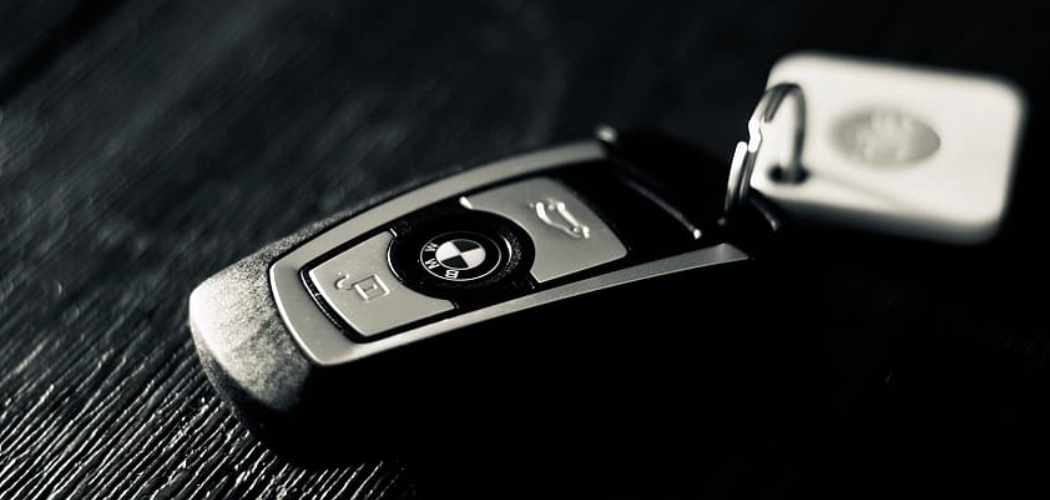Audi key fob cloning is duplicating data from an existing key fob onto a new one. This procedure is often utilized when vehicle owners lose their keys or require an additional fob for convenience. While understanding how to clone an Audi key fob can be helpful, it is crucial to recognize the associated risks and responsibilities. Improper or unauthorized cloning can compromise the security of your vehicle, leaving it vulnerable to theft or unauthorized access.
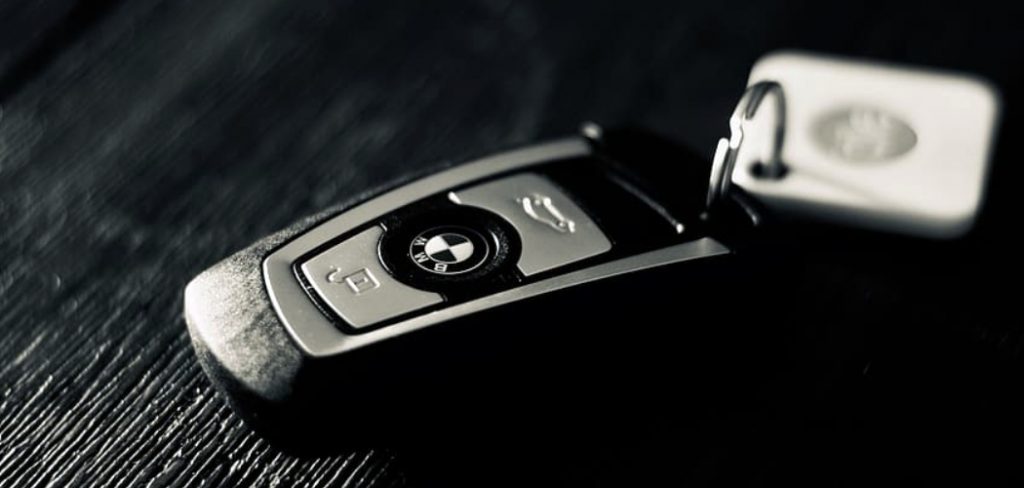
From a legal perspective, cloning a key fob without proper authorization is illegal in many regions and may lead to severe consequences. Ethical concerns also arise, as tampering with a vehicle’s security system without consent can impact its integrity and functionality. To ensure safety and compliance, it is essential to rely on certified professionals or authorized Audi dealerships for the key fob cloning process.
Understanding Audi Key Fob Technology
Key Fob Types
Audi vehicles utilize various key fob types, each designed to provide convenience and advanced functionality. Standard key fobs typically include buttons for locking, unlocking, and operating the trunk remotely. Proximity keys, however, allow drivers to access and start their vehicle without physically engaging the fob, thanks to sensors that detect its presence. Push-to-start smart keys combine the benefits of proximity technology with enhanced features like keyless engine ignition, offering even greater ease of use.
RFID and Encryption
Audi key fobs employ radio frequency identification (RFID) to communicate securely with the car’s immobilizer system. RFID enables the exchange of signals between the key fob and the vehicle, verifying authenticity before granting access or ignition. This communication is safeguarded by encrypted signals, ensuring that the data remains protected from potential interception or duplication attempts.
Rolling Code Technology
Audi incorporates rolling code technology in its key fobs to mitigate the risk of unauthorized cloning. This technology generates a new, unique code each time the fob is used. The car’s system and the key fob must sync to recognize the updated signal, making it exceedingly difficult for malicious actors to predict or replicate the codes without specialized equipment.
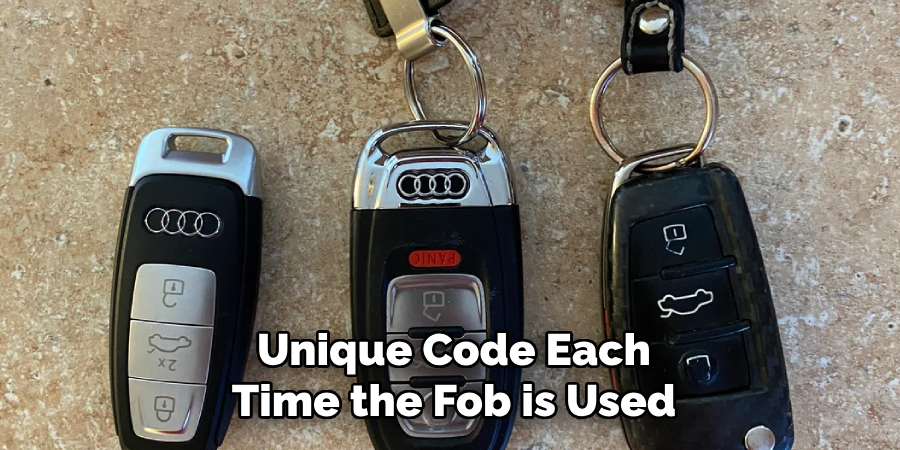
Security Features
Modern Audi key fobs have advanced security features to further discourage cloning efforts. These include encrypted data transmissions and multi-layer validation protocols. While these measures significantly enhance protection, they do not render cloning entirely impossible. However, the complexity of bypassing these systems requires expertise and sophisticated tools, emphasizing the importance of security-conscious practices when handling key fobs.
Legality of Cloning an Audi Key Fob
Legal Risks
Cloning a key fob without the explicit consent of the vehicle owner is illegal in many jurisdictions and constitutes a serious offense. Engaging in unauthorized cloning can be classified as theft or fraud, leading to criminal charges and significant legal repercussions. These actions undermine the security and trust associated with modern vehicle systems.
Authorized Key Fob Cloning
Legal key fob cloning must be carried out by a licensed locksmith or directly through an authorized Audi dealership. These entities require proper documentation, such as proof of ownership, to ensure the legitimacy of the process. This ensures compliance with the law and protects the vehicle owner’s interests.
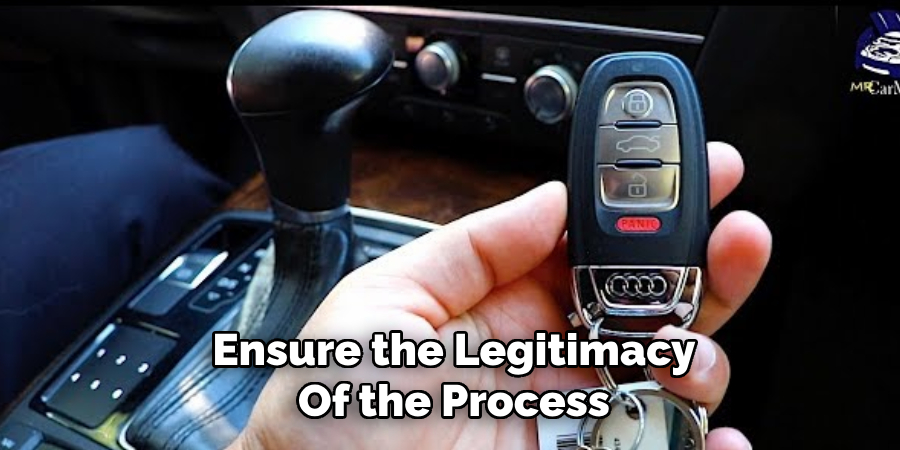
Penalties for Unauthorized Cloning
The consequences for unauthorized key fob cloning can be severe. Offenders risk hefty fines, potential imprisonment, and even the voiding of warranties on the vehicle affected. These penalties reflect the seriousness of compromising a vehicle’s security system.
Best Practice
To avoid legal complications, always ensure that any key fob cloning process is conducted through authorized channels. Following legal and ethical practices is crucial to safeguarding security while maintaining peace of mind.
How to Clone an Audi Key Fob: Key Fob Cloning Process
Cloning Process Overview
Key fob cloning involves a precise process using advanced tools and technology to replicate the functionality of an existing key fob. Below is a step-by-step breakdown of how this process typically works:
Step 1: Accessing the Existing Key Fob’s Data
The first step in the cloning process is to access and extract the data stored on the original Audi key fob. This requires specialized tools, such as an OBD-II device or key programming software, that can analyze the encryption and retrieve the necessary codes. Automotive locksmiths or technicians may use handheld devices designed to read the key’s transponder chip and wireless signals to gather the unique information needed for duplication.
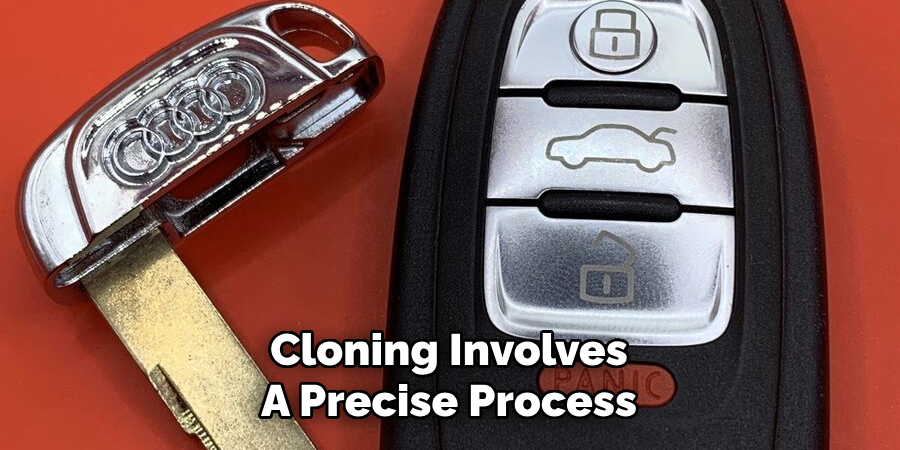
Step 2: Transferring Data to a New Fob
Once the data is successfully extracted, it must be transferred to a new, compatible key fob. This usually involves a cloning device that writes the original key’s digital information onto the chip inside the new fob. The new key fob must match the specifications of the Audi model to ensure compatibility with the car’s communication and security systems.
Step 3: Programming and Pairing the New Fob
After transferring the data, the new key fob is programmed to sync with the vehicle’s immobilizer system. This step is critical to ensure that the cloned fob interacts correctly with the car’s software, allowing it to perform functions like starting the engine, unlocking the doors, and activating security features. This process may also involve using advanced programming tools to pair the fob with the car’s internal computer.
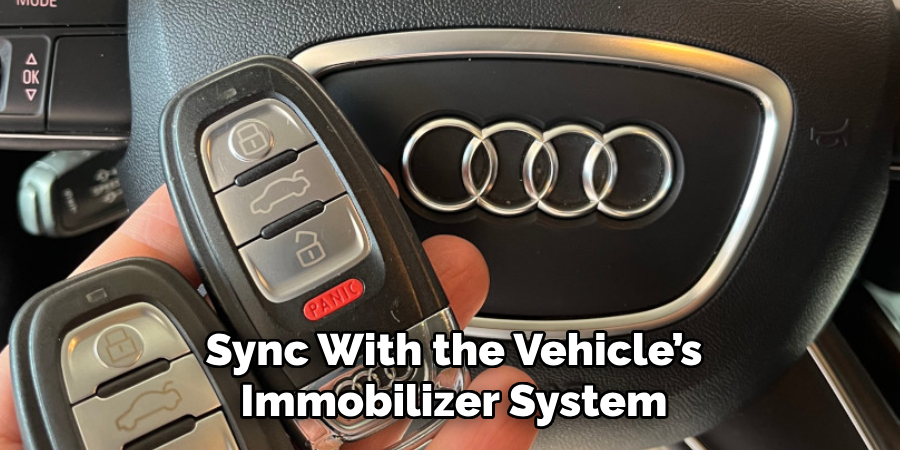
Step 4: Testing the Cloned Key Fob
The final step is thorough testing to ensure the cloned key fob operates exactly as the original. This includes verifying that the fob can lock and unlock the doors, start the vehicle, and perform any additional functions of the original key. Any glitches or failures during testing must be addressed promptly to ensure flawless performance.
Tools and Software
Key fob cloning for Audi vehicles often utilizes specialized equipment and software. Commonly used tools include VVDI, Zed-Full, AutoProPad, and other professional locksmith devices. These tools are essential for accessing encrypted data, transferring information, and programming the cloned fobs securely and effectively.
Risks and Safety Concerns in Cloning Audi Key Fobs
Cloning an Audi key fob comes with various risks and safety concerns that must be carefully considered to avoid potential vulnerabilities and damages.
Security Vulnerabilities:
One of the primary risks lies in the potential for unauthorized access to the vehicle. If the cloning process is not properly secured, it could render the vehicle susceptible to hacking or theft. Ensuring secure and trusted software is critical to mitigating this risk.
Compromised Security:
Poorly executed cloning attempts can lead to improper synchronization with the car’s systems, leaving the vehicle vulnerable to theft or unauthorized use. This could compromise the very security features that key fobs are designed to enhance.
Damage to Vehicle’s Immobilizer:
Incorrect procedures or using incompatible tools during cloning may damage the car’s immobilizer or other electronic systems. Such damage can result in costly repairs or render the vehicle inoperable.
Unauthorized Access:
A major concern is using key cloning technology for nefarious purposes, such as stealing vehicles or accessing sensitive systems without permission. Protecting against this requires strict ethical practice and adherence to safe procedures.
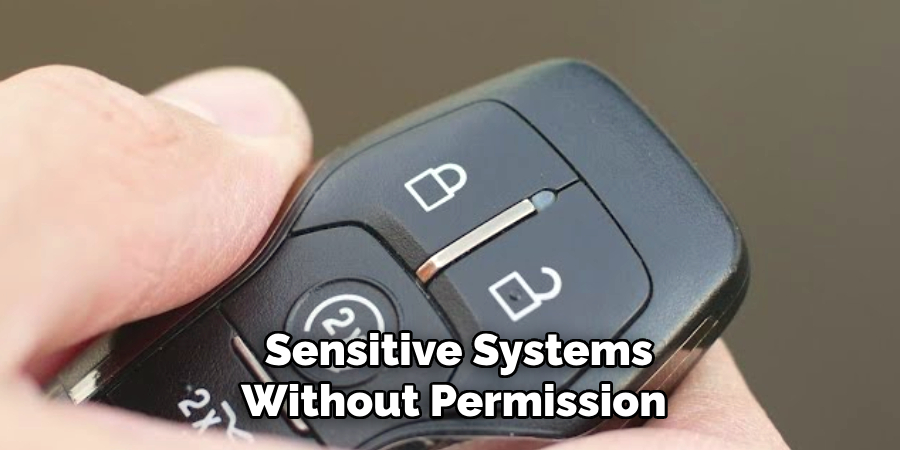
Recommendations:
To ensure safety and security, hiring a professional, certified locksmith or utilizing authorized Audi dealerships for key fob cloning is highly recommended. These professionals have the expertise and necessary tools to perform the process securely, reducing risks and ensuring reliable results.
How to Safely Clone Your Audi Key Fob
When closing your Audi key fob, you should always be cautiously approached to ensure your vehicle’s safety and security. Here are key considerations to help guide you through the process safely and effectively:
Professional Assistance
The most secure and reliable way to clone your Audi key fob is by seeking help from a certified locksmith or an authorized Audi dealership. These professionals are equipped with the proper tools and training to perform the procedure accurately, reducing the risk of errors and potential damage to your vehicle’s electronic systems.
Ensure Ownership
Before proceeding with key cloning, ensure you provide proof of ownership, such as a valid car registration and personal identification. This step helps prevent unauthorized cloning and ensures that only rightful owners can replicate their keys.
Authorized Key Cloning Services
Utilizing authorized key cloning services ensures the process complies with legal guidelines and safety standards. These services offer peace of mind by utilizing secure methods and reliable tools to create functional duplicate key fobs without compromising vehicle security.
Avoid DIY Methods
While DIY key cloning might seem cost-effective, it often introduces significant risks. Unreliable techniques or low-quality tools can malfunction key fobs or even compromise your vehicle’s security. Avoid engaging in such methods to protect your investment.
Using Proper Tools
If you choose to attempt key cloning at home, invest in professional-grade equipment such as an OBD-II scanner or a reliable key cloning device. Carefully follow the manufacturer’s instructions to minimize errors and ensure compatibility with your vehicle.
Backup and Spare Keys
To avoid complications in emergencies, always keep a backup key fob available. Having a spare key on hand reduces the need for cloning when an original key is lost or damaged, offering a practical and secure solution.
By adhering to these recommendations, you can safely and efficiently clone your Audi key fob while ensuring the continued security of your vehicle.
What to Do If Your Audi Key Fob Is Cloned or Stolen
If you suspect your Audi key fob has been cloned or stolen, it is crucial to immediately safeguard your vehicle. The first step is to contact Audi support or your local dealership to report the incident. Prompt reporting can help prevent any potential security breaches and ensure proper steps are taken.
Deactivating the Cloned Key Fob
Audi dealerships can deactivate the cloned or stolen key fob from your vehicle’s system. This ensures that the compromised key fob is rendered useless and can no longer access your car.
Reprogramming New Fob
To enhance security, it is advisable to have your vehicle’s system and remaining key fobs reprogrammed by a professional. This step ensures that your car’s system only recognizes authorized fobs, protecting you against future risks.
Consider a New Set of Keys
Replacing all key fobs associated with the vehicle may be necessary for maximum security. Investing in a completely new set of keys eliminates any vulnerabilities posed by the stolen or cloned fob.
Track Unusual Activity
After addressing the immediate issue, monitor your vehicle for any signs of unusual activity, such as unauthorized lock or unlock attempts. Staying vigilant ensures that you can detect potential security concerns early and take additional action if necessary.
Conclusion
Understanding the risks associated with “how to clone an Audi key fob” is crucial to protecting your vehicle and ensuring your peace of mind. This article has highlighted the processes involved in addressing cloned or stolen key fobs, emphasizing the importance of reprogramming affected systems and replacing compromised keys. Always handle key fob cloning issues through authorized professionals to maintain optimal safety and security. Protect your key fob from potential theft or unauthorized duplication by staying vigilant and taking proactive measures. Audi owners are advised to seek assistance only from certified locksmiths or authorized dealerships for secure and reliable solutions.

